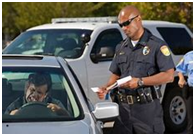
“A Piece of My Mind”
October 2019 Newsletter
Advancing Christian Faith and Values,
Defending Religious Liberty for All,
Supporting Civility and the Common Good
through Preaching, Teaching, Writing, Activism and Reasoned Conversations


Jarrid Wilson was a pastor at Harvest Christian Fellowship in Riverside CA. He was a close friend of my daughter and son-in-law. They camped together in Mammoth Lakes this past summer. Jarrid was ring bearer at my daughter’s wedding in 1992.

Jarrid struggled with depression issues and faced up to them positively in his ministry. He founded “Anthem of Hope,” a Christian mental health ministry helping people battling depression, anxiety, self-harm, addiction and suicide.
On September 10 Jarrid took his own life. He was 30. We extend our support and prayer to his family and friends and all who knew of his life and ministry.
The National Suicide Prevention Lifeline (1-800-273-8255) is available 24/7
Back the Badge – Psalm 106:3
“Blessed are those who maintain justice.”
 “The Letter of the Law”
“The Letter of the Law”
vs.
“The Spirit of the Law”
The Letter of the Law:
A motorist in West Hollywood received a $53 citation for parking over a line. The ticket gave the reason: “No portion of the vehicle may be outside space mark.”
The Spirit of the Law:
The City responded to the driver’s Twitter: “We typically refer folks to the contesting information on the back of the ticket. This one may be unique, but we’re not 100% sure.” With no further action by the motorist, the ticket was dismissed.
Several years ago I took a “Laws of Arrest” course at the Orange County (CA) Sheriff’s Department and learned the difference between “letter and spirit” of the law. These words well summarize the importance of this difference:
“Are you using, ‘Letter of the law vs. Spirit of the law’ while working in law enforcement? Most of you who are officers learned this term in the academy or perhaps while in the military. Either way, it is important each officer grow and develop in their job and hone the level of equilibrium needed while dealing with people or situations. Yes, you may have the authority to enforce the law….to the letter, but eventually you will be questioned not only by your administration but most likely in court by judges and lawyers over your decision to enforce the letter of the law….”
 “…Most departments have a traffic department and it is those traffic officers who play the big part of traffic enforcement. Even so, the traffic department should use good balance and go by spirit of the law if at the time it fits. Remember, if we do not have balance in police work things will work against us as society ultimately controls our very moves in law enforcement” [italics mine].
“…Most departments have a traffic department and it is those traffic officers who play the big part of traffic enforcement. Even so, the traffic department should use good balance and go by spirit of the law if at the time it fits. Remember, if we do not have balance in police work things will work against us as society ultimately controls our very moves in law enforcement” [italics mine].
– “Letter of the Law vs. Spirit of the Law,” POLICEVOICE, March 29, 2016
The issue of “spirit versus letter” came home when one of my grandchildren received a ticket for turning right on red without a full stop. It was caught on camera. A camera has neither heart nor head and can’t discern what the “spirit of the law” requires. Only a real officer can do that.
No wonder camera enforcement is so widely hated.
There’s more! Read the 8th Amendment to the US Constitution:
“Excessive bail shall not be required, nor excessive fines imposed,
nor cruel and unusual punishments inflicted.”
Well, the base fine for violating the “right on red after stop” law is $100.
Fair enough. But state and local governments see the ticket as a cash cow.
Various fees, surcharges and penalties are lathered onto the base fine.
What for? Some samples (7 out of a list of 16 that I read):
• The County General Fund
• The County Jail Construction Fund
• The County Automated Fingerprint Fund
• The Emergency Medical Fund
• The State Court Facilities Construction Fund
• The Emergency Air Medical Transportation Fund
• The State General Fund
Bottom line: the final ticket cost climbed to almost $500! *
These extras, mostly unknown to the general public, carry a very negative social consequence. People of small means can’t afford to pay the ticket.
So more penalties are added. Too many unpaid tickets? Big trouble! It becomes a downhill snowball—growing larger each time it goes around.
The Bible teaches the penalty should be appropriate for the wrong.
Like some ticketing practices, the fine process I’ve described breaks the “spirit of the law” and does not generate respect for the law, which is essential to a well-ordered and just society.
* By comparison, my only traffic ticket was for going 60 in a 50 MPH stretch of highway through Ohio farmland. I was tracked by an airplane. The fine was $85.
Message of the Month – Baptism by Pouring
When Rules Give Way to Principles, and Rituals to Compassion
(Here’s more on the “Letter” and “Spirit” of the Law)
We had a most joyous experience at Grace Community Church of Seal Beach several years ago on a Sunday morning. We baptized one of our dear older saints. It was not possible to fulfill this baptism through immersion. So the baptism was done by pouring with the Elders of our church gathered around.
Pouring is not our usual mode of baptism. We baptize by immersion. Indeed, we really do! We baptize by triple immersion—likely the oldest baptismal practice in the Early Christian Church. So what can we say about pouring?
I offer three questions and answers…
1. “WWJD?” – What Would Jesus Do?
Jesus would put a compassionate act ahead of a particular rule or ritual.
[Jesus] went into their synagogue, and a man with a shriveled hand was there. Looking for a reason to accuse Jesus, they asked him, “Is it lawful to heal on the Sabbath?”
He said to them, “If any of you has a sheep and it falls into a pit on the Sabbath, will you not take hold of it and lift it out? How much more valuable is a man than a sheep!” (Matthew 12:9-12 New International Version. It is important to read the entire context: Matthew 12:1-14.)
Then Jesus healed the man, to the irritation of those who were bound by rules. We too must be willing to lay aside a particular way of doing a ritual if fulfilling the spirit of the ritual would lead us to do the ritual a different way.
Some churches might say to someone unable to have immersion baptism,
“We understand you aren’t able be baptized—God understands too.” But that misses the point and is only semi-compassion! Why not give a person the joyous experience of baptism through a different ritual rather than denying someone the joy of the baptism?
2. What does baptism symbolize?
Many things! In fact, baptism is too rich a ritual for any specific method to capture all its meanings.
One important lesson of baptism is that it is a sign of the arrival of the Holy Spirit. In fact, Jesus drew a close linkage between baptism in water and baptism in the Holy Spirit. He told his disciples shortly before the Day of Pentecost, “John baptized with water, but in a few days you will be baptized with the Holy Spirit” (Acts 1:5).
And just how was our Lord’s promise of the baptism of the Holy Spirit fulfilled on the Day of Pentecost? The Holy Spirit was “poured out” on the waiting, submissive disciples! To have the Holy Spirit “poured out” on them was one and the same as being “baptized” in the Holy Spirit. Simon Peter explained it this way: “Exalted to the right hand of God, [Jesus] has received from the Father the promised Holy Spirit and has poured out what you now see and hear” (Acts 2:33). In fact, Peter said that the coming of the Spirit fulfilled the promise of the prophet Joel, that God would “pour out” his Spirit on all people (Acts 2:17).
I’ll go so far as to say this: If I only had the Book of Acts to go by, I would assume baptism was probably done by the pouring method! Also, since the Spirit is poured out on us effusively, baptism by pouring should be effusive too. We’d do our best to drench you!
3. What would the Early Church do?
A likely answer might come from the oldest document we have, outside the New Testament, which gives us a glimpse into the life and teaching of the Early Church. It’s called The “Didache” (“did-a-KAY”), known as “The Teaching of the Twelve Apostles” (none of whom probably ever saw it).
It was written in the common Greek language of its time with a gentile Christian audience in mind. It’s an excellent little discipleship manual that would guide new Christians in The Faith—even today. The “Didache” is dated anywhere from AD 50 to AD 125. You might want to do a search for “Didache” on your computer and read its simple teachings for yourself.
Here’s what the “Didache” had to say about baptism [bold mine]:
Chapter 7. Concerning Baptism. And concerning baptism, baptize this way: Having first said all these things, baptize into the name of the Father, and of the Son, and of the Holy Spirit, in living water. But if you have no living water, baptize into other water; and if you cannot do so in cold water, do so in warm. But if you have neither, pour out water three times upon the head into the name of Father and Son and Holy Spirit. But before the baptism let the baptizer fast, and the baptized, and whoever else can; but you shall order the baptized to fast one or two days before.
This is what it teaches: (1) baptism should be done in “living (running) water” or cold or warm water; (2) if those kinds of water were not available, pouring is permitted; (3) the pouring is to be “three times upon the head” by the Trinitarian formula (Matthew 28:19). The strong inference is, the preferred mode of baptism was most likely a triple immersion, since a triple pouring was permitted as a substitute mode if the necessary water was lacking. But the mode of pouring was certainly acceptable too.
The point I make is this: If pouring was an acceptable mode of baptism due to insufficient water for immersion, certainly it is an acceptable mode of baptism if done for some other good reason.
My Conclusion
Jesus put mercy, compassion, and people’s well being ahead of rules and rituals. He let the spirit of the Law trump the letter of the Law. The church should do the same. We would neither want to miss for ourselves nor deny to another the joy of Christian baptism!
ENDNOTE: TAKE CARE HOW YOU QUOTE THE CHURCH FATHERS
The Church Fathers are excellent sources of primary information on the thinking of the early church and secondary information on what the Bible taught. But there are cautions. First, since many writings by the church fathers are responding to controversies within the church, we can’t assume they are speaking for the entire church.
Second, quotations from the church fathers must be taken in their contexts, not “proof-texted” to support what we want to prove. Of course the Bible itself is never to be misused this way either.
“Wonderful things in the Bible I see,
When they are put there by you and by me.”
Here’s an example: my church tradition practices baptism by triple immersion (discussed above). Indeed, there are clear references to triple immersion in the church fathers.
When I was a seminary student (1966-69) the syllabus of my course “Denominational Beliefs and Practices” listed several church fathers as extra-biblical support for triple immersion. The summary sentence was: “The testimony is unanimous for trine immersion among the early fathers, and there is not a dissenting voice.” *
That’s quite a triumphant statement, underscored by the tautology. But is it really correct? One church father cited ** was Basil the Great (fourth century). And yes, he spoke of triple immersion baptism. But for what purpose?
Basil asks, “Whence the rule of trine immersion? And the rest of the ceremonies at baptism…from what Scripture are they taken? Are they not all from the unpublished and private teachings, which our Fathers kept under a reserve inaccessible to curiosity…?” ***
Basil’s whole point in a lengthy section is that baptism by triple immersion and many other rituals the church practices DO NOT HAVE A BASIS IN SCRIPTURE. RATHER, THEIR BASIS IS FOUND IN CHURCH TRADITION.
Context matters!
* “Denominational Beliefs and Practices” by Dr. Herman A. Hoyt, page 43.
** The claim about Basil was a secondary reference, taken from God’s Means of Grace by Charles F. Yoder. Secondary reference should be viewed with caution and only used when the primary source is not available or when the point of the reference is minor.
*** Basil the Great, De Spiritu Sancto, chapter 27, paragraph 66. Also see: “The Longer Catechism of the Orthodox, Catholic, Eastern Church” in The Creeds of Christendom by Philip Schaff, volume 2, pages 448-50.
First Amendment Vigilance – When to Limit Speech
 “Congress shall make no law respecting an establishment of religion, or prohibiting the free exercise thereof, or abridging the freedom of speech, or of the press; or the right of the people peaceably to assemble, and to petition the Government for a redress of grievances.”
“Congress shall make no law respecting an establishment of religion, or prohibiting the free exercise thereof, or abridging the freedom of speech, or of the press; or the right of the people peaceably to assemble, and to petition the Government for a redress of grievances.”
 A gentleman I met in the dairy department at my local supermarket was wearing the T-shirt modeled here:
A gentleman I met in the dairy department at my local supermarket was wearing the T-shirt modeled here:
I commented to him about it, and he replied that someone recently told him at a bowling alley to take it off and wear it inside out! He refused. Good for him!
The First Amendment’s “free speech” guarantee does not protect us from speech policies at work or in many other contexts, such as in our homes and churches. It DOES protect us from any government limitations on speech, including at government locations like public universities (many of which apparently don’t know that).
But the First Amendment has GREAT TUTORIAL POWER, in that it creates an atmosphere of freedom in the country generally. For example, raunchy or intimidating speech excluded, we generally accept how others choose to express themselves. Cultural mores traditionally guide and temper what we say, unless these mores break down.
Sincere commendation of others needs no justification. Criticism of others on the other hand generally requires that we have earned the right to be heard. We can give criticism in a moment of urgency (because a necessity to be heard exists), or with friends and family, or with business associates (when constructive criticism is cultivated), or between pastors and church members, or with subordinates. And we can approach others respectfully and “knock and ask permission” to criticize.
Otherwise civility may suggest we restrain ourselves. Read on:
Bible Insight – Speaking with Civility
“No one can tame the tongue. It is a restless evil, full of deadly poison. With it we bless our Lord and Father, and with it we curse people who are made in the likeness of God. From the same mouth come blessing and cursing. My brothers, these things ought not to be so.” – James 3:8-10
“Let no corrupting talk come out of your mouths, but only such as is good for building up, as fits the occasion, that it may give grace to those who hear.”
– Ephesians 4:29
What would the biblical writers say about communicating today via all the “social media” options? Today we talk with our fingertips, not just with our tongues. And the potential impact of our words is far greater. Words once spoken are irretrievable, but retraction is usually much easier when we speak with our voices.
So…is it too much to ask for our president and other governmental leaders to be exemplary when they communicate?
The power of their words is immense as they lead by example, for good or ill.
Here’s what happened during September: President Trump tweeted about Jonathan Karl, an ABC News reporter, calling him a “lightweight reporter.”
Or so the president intended.
Instead, by misspelling the last name as “Carl”, he actually tweeted about a Baptist pastor in Kentucky by that name. Soon after that, Pastor Carl received tweets of “intense vitriol and hatred” from supporters of the president.
With measured and reasonable words, Pastor Carl gave this advice to the president: “Please don’t make the Twitter-universe such a dark and depressing place. It shouldn’t be a place to argue, fight, or jockey for position. We can disagree and debate without childish name-calling. You can make Twitter a better place.”
In all our communications we should re-read our comments to check spelling and grammar and—more important—to be sure it says what we mean it to say and it speaks in a way that honors the dignity of persons. And when we do need to say something negative, we “sleep on it” before we hit “send” and we include in the readership no more people than necessary. How many times haven’t I re-read the next morning the comments I wrote the evening before and realized they should not be sent the way I first wrote them!
I wrote this (adopted) Resolution for my denomination’s annual meeting in July:
Civility in speech and good conduct toward others who are in God’s likeness are our duties. Our communications with one another must be consistent with loving our neighbor as ourselves.
Civility must begin at the highest levels of government—the president and the Congress in America—and continue to all other levels.
Civility must avoid the ad hominem attacks on opponents that have become so much a part of today’s charged political climate.
Civil communication must characterize all “social media” and Christians especially must not communicate with gossipy, malicious, or oppressive words in their use of social media.
 Don’s Recent Ministry
Don’s Recent Ministry
Don’s message of July 28: “Jeremiah—Right Man for the Right Hour” (Jeremiah 1-20) can be heard at
www.gracesealbeach.org under “Resources”.
Lead Prayer Time at Seal Beach Prayer Breakfast on November 3. Locals can sign up for this event at:
www.sealbeachprayerbreakfast.com
Website: www.donaldshoemakerministries.com
Contact me at: donaldshoemakerministries@verizon.net
Appendix – A Good Voice from the Past
 Charles Colson comments on the impeachment processes
Charles Colson comments on the impeachment processes
in 1972 (Richard Nixon) and 1998
(Bill Clinton)
[1998] If the House of Representatives passes an impeachment resolution this coming week, it does not mean the president is going to be turned out of office. It simply means that the House has made a finding that there is credible evidence …
The Senate’s job will be to decide how to dispose of the matter: Do nothing, plea bargain, censure, or conduct a trial.
In their wisdom, our Founding Fathers designed a way we could bring to trial the only man in America who cannot be tried in the courts while he sits in office: the president of the United States. They intended no man to be above the law, a concept that reflects a major Christian contribution to the founding of our nation.
The House action will not, I repeat, not, despite what the president’s defenders claim this week, overturn the election results.
Nearly 25 years ago, I sat in the witness chair facing the House Judiciary Committee during the impeachment hearings of Richard Nixon. It was hardly a happy day for me because I was there to testify under oath about all the transgressions we now know of as Watergate.
I left the hearings that night knowing I was going to prison, despondent because I knew that my friend President Nixon would soon be out of office. But, in a sense, I had a renewed confidence in the American system. Why? Because the congressmen seemed genuinely concerned about upholding the law. Even the Republicans, mostly partisan defenders of Nixon, recognized that the integrity of the presidency was on the line, and what was right had to take precedence over politics. Even though I was on the losing end, I was reassured that the American system was stronger than any man or partisan interest.
And for all of us who are Christians, regardless of how we view this process, let us remind ourselves that we serve a God who rules over the affairs of men—whether they know it or not.
[Excerpts from BreakPoint Daily, “How to Think about Impeachment”, September 27, 2019]

